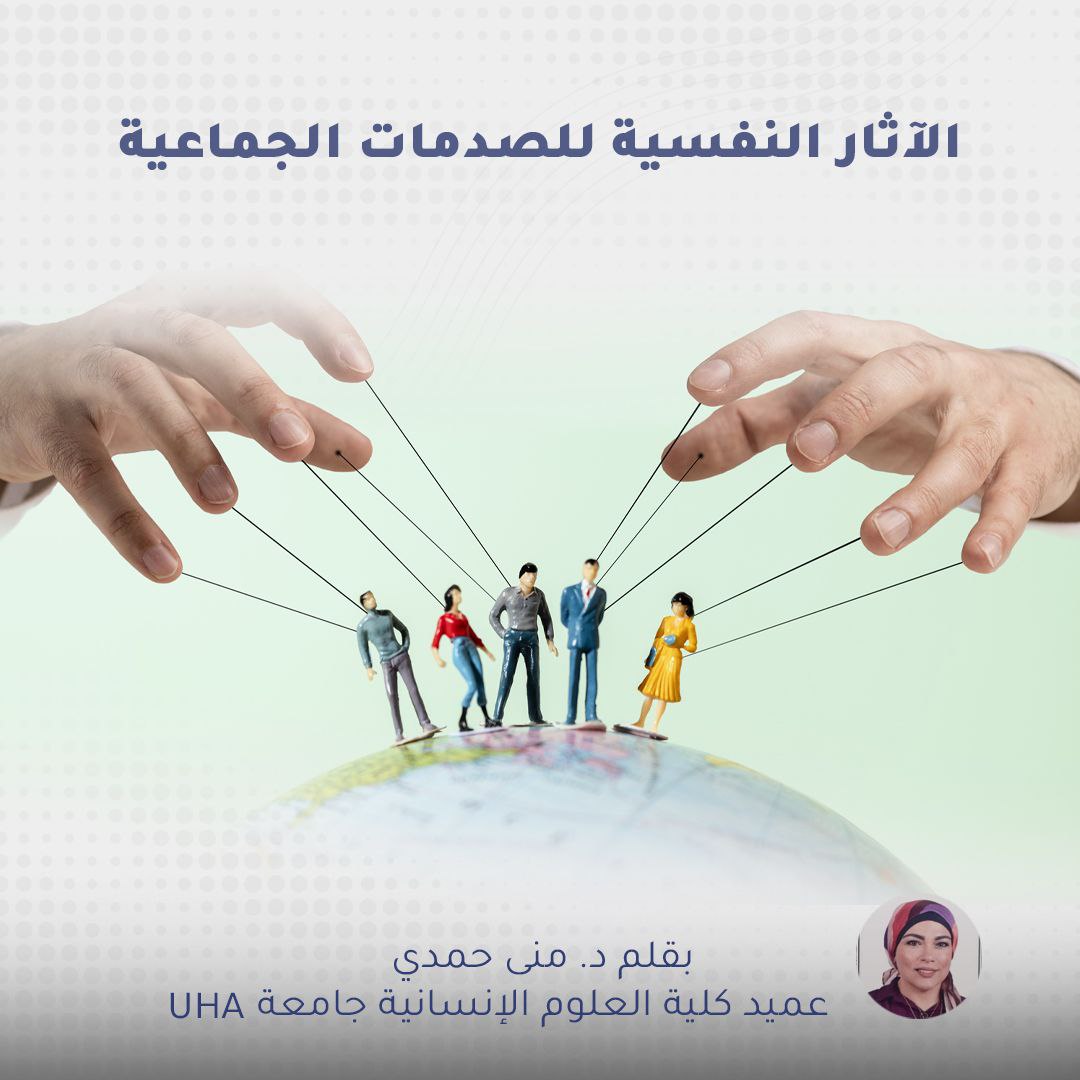
The Psychological Effects of Collective Trauma.
6 months ago
بقلم : Dr. Mona Hamdi
The Psychological Effects of Collective Trauma: A Theoretical and Analytical Study on the Long-Term Impact on Mental Health in Conflict-Affected Communities.
Abstract:
Collective trauma is considered one of the most serious factors affecting individuals’ psychological well-being, particularly in communities suffering from wars, conflicts, and disasters. This study aims to analyze the long-term psychological effects of collective trauma and discuss the theoretical models that explain these effects, such as the Continuous Traumatic Stress Model and the Collective Trauma Theory. It also highlights the cultural and social challenges facing psychological recovery in conflict settings. The study is based on an analysis of recent Arabic and international literature and emphasizes the importance of community support and collective psychological interventions as means of promoting recovery and societal healing.
Keywords: collective trauma, mental health, conflict, cultural model, continuous stress, post-traumatic stress disorder (PTSD)
Introduction:
Collective psychological trauma is defined as a distressing experience endured simultaneously by a large number of people due to a catastrophic event, conflict, or natural disaster. Recent studies have demonstrated that the effects of collective trauma extend beyond individuals to impact the social and cultural fabric of the community.
While many societies in the Arab world are currently experiencing wars and conflicts, it becomes essential to study the psychological impacts of such events and how they intertwine with cultural, religious, and social factors to form a complex picture of collective psychological suffering.
Long-Term Psychological Effects of Collective Trauma
Research indicates that prolonged exposure to collective trauma significantly increases the likelihood of developing PTSD, chronic anxiety, depression, and even changes in both individual and collective identity (Hirschberger, 2018).
It has been observed that individuals in war-affected communities display behavioral patterns indicative of difficulty in adaptation, such as social withdrawal, emotional numbness, or hypervigilance. Some also develop a sense of collective helplessness and loss of trust in the future (Saul, 2014).
Theoretical Models Explaining Collective Trauma
Among the most prominent theoretical models that explain collective trauma are:
-
Collective Trauma Theory: Suggests that a society as a whole can experience deep disruption as a result of a traumatic event that affects its identity and collective memory (Alexander, 2004).
-
Continuous Traumatic Stress Model: Proposes that living under chronic conflict conditions leads to responses that differ from those caused by a single traumatic event, as there is no opportunity for healing or stability (Eagle & Kaminer, 2013).
Cultural and Social Factors Influencing Trauma Response
Culture plays a significant role in shaping how individuals and communities understand and respond to trauma. In Arab cultures, for example, expressing psychological distress may be perceived as weakness, which discourages individuals from seeking treatment (Abdel Sattar Ibrahim, 2010). Religion can also play a dual role — either as a supportive element by promoting meaning and hope, or as a mechanism for denial of pain.
Comparing Western and Arab Studies on Collective Trauma
While Western studies often focus on the individual effects of trauma, Arab studies especially in the context of Syrian and Palestinian conflicts highlight the collective dimension of psychological distress, where suffering is seen as a shared social experience rather than a personal one.
For instance, a study published in the Arab Journal of Psychology (2019) found that Syrian refugee children exhibit severe behavioral disorders, yet simultaneously demonstrate collective coping mechanisms through play and social bonding, reflecting the partial supportive role of their cultural environment.
Conclusion:
This study reveals that collective trauma leaves deep and long-lasting psychological effects on individuals and societies, especially in war and conflict contexts. Addressing these phenomena requires a contextual understanding that integrates psychological and cultural knowledge. It also demands collective and integrated interventions that consider social, religious, and cultural dimensions. Developing community-based psychological support programs in conflict-affected societies and adopting culturally sensitive approaches represent essential steps toward comprehensive societal recovery.
References:
- Alexander, J. C. (2004). Toward a Theory of Cultural Trauma. In Cultural Trauma and Collective Identity. University of California Press.
- Eagle, G., & Kaminer, D. (2013). Continuous traumatic stress: Expanding the lexicon of traumatic stress. Peace and Conflict: Journal of Peace Psychology, 19(2), 85–99.
- Hirschberger, G. (2018). Collective trauma and the social construction of meaning. Frontiers in Psychology, 9, 1441.
- Saul, J. (2014). Collective trauma, collective healing: Promoting community resilience in the aftermath of disaster. Routledge.
- Abdel Sattar Ibrahim (2010). Mental Health and Psychotherapy Across Cultures. Anglo Egyptian Bookshop, Cairo.
- Arab Journal of Psychology (2019). “The Psychological Effects of Conflict on Childhood: The Case of Syrian Refugee Children in Lebanon,” Issue 3, pp. 45–68.

